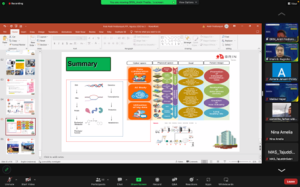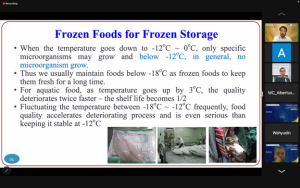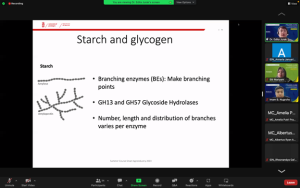
The 6th day of the 5th Smart Agro-industry Summer Course was held successfully on August 12th, 2023. On this day, two national and two international speakers participated in online lectures. The first session was by Prof. Dr. Eng. Kuwat Triyana, M.Si., from the Faculty of Mathematics and Natural Sciences UGM and Anggoro Cahyo Sukartiko, S.T.P., M.P., Ph.D. as the moderator. The next session was by an Indonesian researcher from the Research Center for Food Technology and Processing, National Research and Innovation Agency (NRIA – BRIN), Dr.rer.nat. Andri Frediansyah, S.Si., M.Sc. and moderated by Imam Bagus Nugroho, S.Si., M.Sc. The afternoon session continued with talks of Prof. Kune-Muh Tsai from the National Kaohsiung University of Science and Technology. The moderator on duty was Moh. Wahyudin, S.T.P, M.Sc. The closing session was a lecture by Dr. Edita Jurak from the Faculty of Science and Engineering, The University of Groningen, while Imam Bagus Nugroho, S.Si., M.Sc. led the discussion.
The topic of Prof Kuwat’s lecture was Smart Sensors Technology and Development for Implementation in Agro-Industry. He started his explanation by introducing one of Universitas Gadjah Mada’s great inventions during the COVID-19 pandemic, GeNose, the sensor technologies for detecting COVID-19 patients. After that, he tried to explain the working principle and the application of the electronic tongue (e-tongue) and elaborated it well on the food system, as the technology is a versatile tool in food analysis, enabling accurate and objective assessment of taste and flavor attributes. The applications extend across quality control, safety monitoring, product development, authenticity verification and even environmental analysis.

The lectures on the 6th day were not only about artificial intelligence technologies and e-tongue, but they were also about food microbiology and biotechnology. The next session was by Dr.rer.nat. Andri Frediansyah, S.Si., M.Sc. on Food Processing Using Microbes: From Lab to Industry. To give a basic understanding, he explained the basic concept of microbiology and the role of microorganisms in food fermentation as one of the oldest methods for transforming and preserving food in the industry. In addition, he also explained the challenges that probiotics had to face as fermentation products with high levels of demand. The microbial revolution in the food industry using cutting-edge omics technologies has been the way of overcoming the challenge of expansion from lab to industrial scale.

The first of two last sessions after lunch break was a lecture by Prof. Kune MuhTsai on Supply Chain Innovation for Sustainable Food Logistics. He brought up the challenges from farm to table to serve fresh food without losing food and producing waste. Although the lecture was not straightforward to the core of the topic, he tried firstly to give the basic concept of temperature control and cold storage. The cold storage concept was considered good ammunition for innovation creation. He also talked about the regulation and food safety aspect to ensure that the food from this supply chain can sustain. The session ended with study cases prepared by the professor to build up the way of thinking and applicable solutions for the supply chain in food logistics.

The last session for the 6th day of the 5th Summer Course was another scope of microbiology and biotechnology for industrial implementation. The title was Plant Biomass-based Product Engineering by Microbial Enzymes Application, delivered by Dr. Edita Jurak. There were three main parts of the lecture: first, microbial gene clusters that work together in concert to degrade and modify complex polymers (biomass and plastic). She elaborated further on degrading polymers that require simultaneous microbial gene expression for enzymatic catalysis. She ended her session by giving examples of sources of novel enzymes for biocatalysis.
